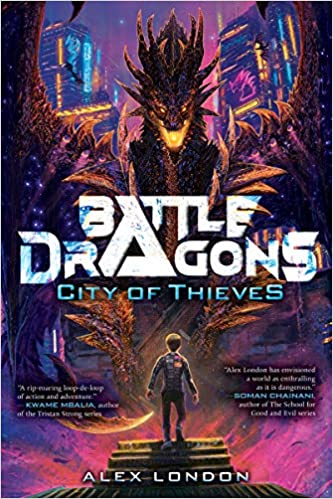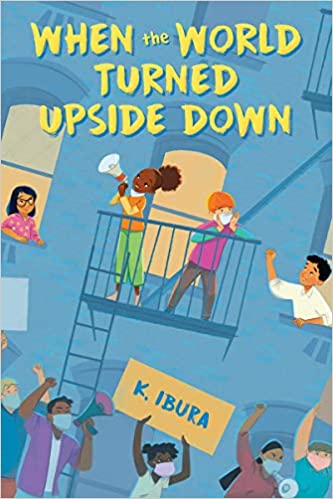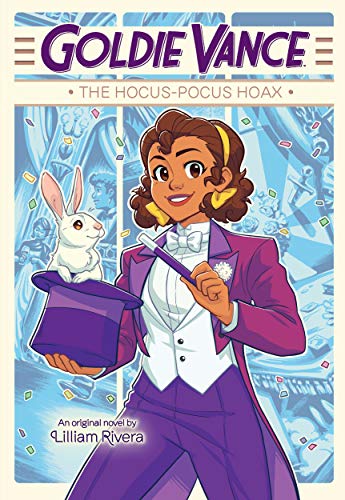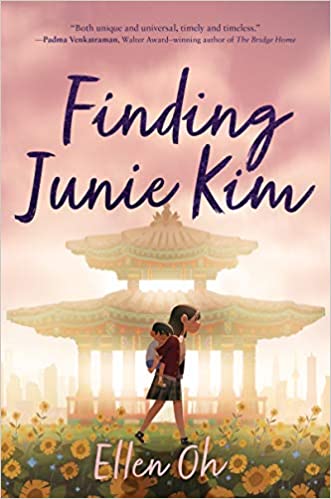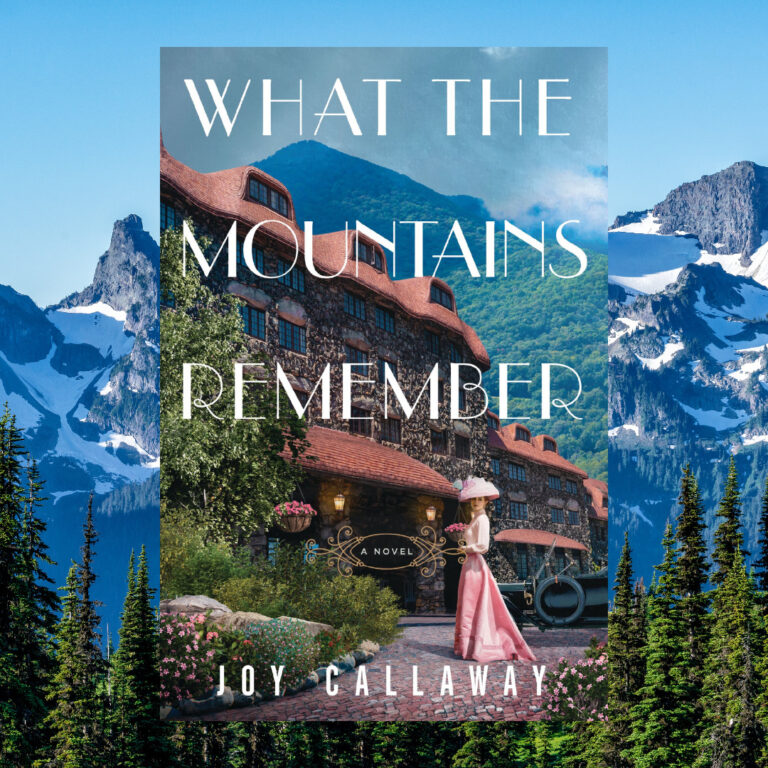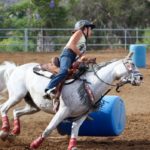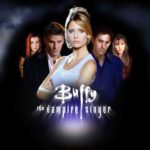[Note from Frolic: Aurora got the chance to chat with some of the buzziest Middle Grade authors in the biz and ask them all about their latest books. Up first, Alex London!]
Aurora: What was your inspiration behind Battle Dragons: City of Thieves?
Alex London: There are countless inspirations for any novel, but this one combined so many influences that fueled my imagination when I was a middle schooler. It combines my love of cyberpunk like Akira and Blade Runner and even Johnny Mnemonic with my love of fantasy, of dragon lore, and ultimately of stories set in that middle school time, when young people start to come into their own and realize how much bigger, complicated, and wonderful the world is than they ever dreamed. I wanted to write a story that would have appealed to me in middle school, but that would’ve also expanded my imagination for what kind of a world was possible.
Please describe the content of Battle Dragons: City of Thieves and what can readers expect from it.
The short pitch is that it’s The Fast and The Furious meets How to Train Your Dragon, but it’s very much its own thing. Battle Dragons tells the story of 13 year old Abel and his friends and family, who get caught up in the criminal dragon battling underworld of Drakopolis, the mega-city where they live. Dragons do everything there, from haul freight and transport busses, to work in mines and serve the ferocious military. There are corrupt dragon-riding gangs—called kin—and corrupt secret police whom the kin pay off. There are sibling rivalries and new friends and high stakes dragon riding action. There are also, I hope, a lot of laughs! I had so much fun with the world building, I hope readers enjoy some of the little details with which I amused myself. I’m particularly fond of the brands of candy bar and of the Dragon Drag Queen, who makes a brief, but fabulous, appearance.
Why do you feel middle-grade series with powerful and unique themes are so popular and have such a voice right now?
I don’t think their popularity is unique to this moment. Middle grade readers generally have open minds for all kinds of stories, as long as those stories are gripping and honest. You can write about dragons or you can write about first-crushes or best friend break-ups, as long as you write with emotional honesty and immediacy and humor. Young readers will follow you anywhere as long as you don’t lie to them about things that matter. I can invent dragon riding gangs as long as the voice of the thirteen year old protagonist feels like a real kid’s voice, with real hopes and fears and needs.
And of course, the appeal of series at that age is that you never love a book as much as you do in the middle grades (and you also never hate one as much), so when you find one to love, of course you want to spend more time in its world and with its characters. A series gives you the chance to immerse yourself more deeply in the worlds you love.
What’s next for you in the bookish world?
Right now, I’m working on Book 2 in the Battle Dragons series! It’ll be even more exciting, higher stakes, and action packed with the first one, with (I hope) just as much heart. Our characters and their communities are in for a wild ride…literally, as this one involves not just dragons battling, but dragons racing. Think Seabiscuit, but breathing fire and ridden by the Hells Angels.
Who is your current favorite writer? Why?
I couldn’t possibly choose a favorite writer or even a favorite book. There are too many I love, though some I do keep closer to the bed. Ursula Le Guin is forever an inspiration, and I’m recently in love with Martha Wells’ Murderbot Diaries. Right now on my nightstand, I’ve got VE Schwab’s The Invisible Life of Addie LaRue, a nonfiction history book about vice and crime in Hot Springs, Arkansas called The Vapors by David Hill and a history book by Hugh Ryan called When Brooklyn was Queer. I just finished The Only Good Indians, a terrifying, moving and totally engrossing horror novel by Stephen Graham Jones. In middle grade, I’m about to dive in to The Last Gate of The Emperor by Kwame Mbalia and Prince Joel Makonnen.
Any writing advice for aspiring writers?
The only universally applicable writing advice I can think of is: Be kind to yourself.
Up next, K. Ibura!
Aurora: What was your inspiration behind When the World Turned Upside Down?
K. Ibura: The contemporary world was the inspiration for When the World Turned Upside Down. I was literally writing it while the pandemic and the recent explosion of conversations about social justice ignited. At first, when I first pitched the book, it was solely about the pandemic. I’m so inspired by young people and I was thinking about their lives during these unprecedented times. I think I was under a bit of quarantine fever to stand at the beginning of this unprecedented time in all our lives and decide, Yeah, I’m going to write a book about this. I actually had already written the outline and was working on the sample pages when George Floyd was murdered. A few days had passed and I found myself in tears on a conference call and I thought, this book has to include social justice topics. So the plot of the book was rewritten to reflect the tumultuous reckonings of 2020.
Please describe the content of When the World Turned Upside Down and what can readers expect from it.
When the World Turned Upside Down is layered. It focuses on four distinct characters and the unique situations that they are encountering as a result of the pandemic. Readers can expect to take an intimate look at four families’ lives as they wrestle with quarantine and all the complex emotions and personal impact that comes from isolation. Embedded in each of these stories is a quest for identity and self-definition. Each character has to reckon with who they are and how they want to show up in their friendship and in the larger community. On a larger level the book is about finding an authentic place from which you can influence the world. So these three levels—intimate/personal, interpersonal, and communal—are all interwoven as the characters discover a blueprint for having their voices heard as they participate in racial justice work in an age-appropriate way.
Why do you feel middle-grade books with powerful and unique themes are so popular and have such a voice right now?
I think 2020 was a year of Emergence. We became aware of so many voices and so many communities in 2020—and that has continued in 2021. But that level of emergence doesn’t come from nowhere. The voices that broke onto the national and global stage were grounded in conversations that have been ongoing for many, many years. In the recent decade, I think we’ve been growing in our understanding of children’s voices and identities. Seeing children operate to build equity and change in the areas of education, financial access, the environment and more demonstrates the level of awareness and analysis that children possess. And if children possess this level of awareness, then so should their education, and so should their literature, and so should their conversations at home so that we are expanding possibilities of understanding and empathy among younger and younger children.
What’s next for you in the bookish world?
What’s next for me in the book world is a young adult novel about a girl with superpowers. In my background, I’ve written a lot of speculative stories for adults. So this new book will be part of a two-book fantasy novel that’s set in the real world. I’m very excited about bringing it to readers in 2022.
Who is your current favorite writer? Why?
I’m strong enough to admit that I have fallen off the reading bandwagon. I am so obsessed with my games on my phone that I am woefully behind in reading. Even when I am reading, I’ve always struggled with this question. I think it’s because I find so much value in so many different writers (and my memory is horrible so I’m always paranoid that I won’t remember to mention something or someone I absolutely loved.) So rather than talk about my favorite book, I’ll talk about three books I read while writing When the World Turned Upside Down. The first is Billie Holiday’s Lady Sings the Blues, which she told to a writer she knew and he wrote it down. The book is rambling and has no structure and isn’t easy to read, but there is one section where she talks about how hard it was for her to travel with a group of white musicians. They all had a great relationship, but whenever it was time to eat or time to find a room for the night, there were major problems. When they entered a restaurant, they never knew if she would be served, or told to eat in the kitchen, or if there would be a fight and everyone would get thrown out—resulting in everyone going hungry. She became sick on this trip and somehow, I remember reading it and thinking, wow, I wonder how my parents dealt with this. Then my next thought was, wait a minute, if my parents grew up in segregated America, then I am in the first generation of Black people in this country not to live in segregation. The thought just blew my mind. We talk a lot about the civil rights movement, like it’s stuck in history, but we are just one generation removed from those times and clearly, much of the thinking fueling segregation and violence against nonwhite communities is alive and well. Then there were two books I read specifically for this book. I wanted to see what social justice really could mean for young people. So I read This Book Is Anti-Racist and Not Your Idea. Both these books are for young people. This Book Is Anti-Racist is a chapter book and Not My Idea is a picture book. Both books look to expand children’s ideas of identity, race, and equity—and encourage them to make up their own minds about the world around them.
Any writing advice for aspiring writers?
Write! And then write some more. And then write even more. I run an accountability group for writers and the biggest thing I tell them is “keep going.” Writing is exhausting and solitary work. Not to say it is not full of delight and magic and creative adventure. It is full of so many wonderful discoveries, but they only come if you show up again and again and again. Mastery builds over time—and it requires you to make one tiny improvement after the other. I say all the time that there are many talented people with an interesting way with words and a unique story to tell. But whether or not they tell it depends on how much commitment they have, how much grit they have, and how long they will hang in there as they develop their skills and find their way through the literary landscape.
Next up, author Lilliam Rivera!
Aurora: What was your inspiration behind your most recent book?
Lilliam Rivera: The inspiration behind Goldie Vance: The Hocus-Pocus Hoax is always the comic books. I’m obsessed with the works Hope Larson and Brittany Williams created so I’m always going back to the original source. As for the story, I love magic and magicians. I wanted Goldie to encounter that world, to be a little skeptical, and to have a mystery involving things that go poof!
What character in this book do you most relate to and why?
The character I relate to the most is Goldie because she is full of confidence and tries to find the best in everyone. She’s a great reminder to go after what you believe in and enlisting your friends to help. I love that!
Why do you feel books with powerful and unique characters are so popular and have such a voice right now?
I don’t think this is a new phenomenon. Readers are attracted to strong young characters because they see a little of themselves or they wish to inject a little of their attitude. What is great about Goldie is that she just wants to solve the mystery and all obstacles placed in front of her she figures out ways to go around them. Plus, she has such a positive attitude. She’s really inspiring.
Please describe the content of your latest book and what can readers expect from it.
Goldie Vance: The Hocus-Pocus Hoax is the second book in a series inspired by the comic books created by Hope Larson and Brittany Williams. In this novel, the Crossed Palm Resort where Goldie lives is being overtaken by a magicians convention. But the performances are being sabotaged. It’s up to Goldie to figure out who or what is behind it. There’s a somewhat annoying new character Derek and the regulars are all there (Goldie’s best friends Cheryl and Rob, her mentor Walter Tooey, and Goldie’s crush Diane). It’s a lot of fun!
What’s next for you in the bookish world?
I’m working on a young adult novel for Bloomsbury that will hopefully come out in October. It’s still too fresh to discuss details but I will say it’s set in Los Angeles.
Who is your current favorite writer? Why?
My current favorite writer is Claribel Ortega. Her debut novel Ghost Squad is such a fun, cute middle grade that young readers will devour.
Any writing advice for aspiring writers?
Keep working on your art. You don’t have to write every day. Just read a lot and carve time for your passion.
Last but certainly not least, author Ellen Oh!
Aurora: What was the inspiration behind Finding Junie Kim?
Ellen Oh: It was a number of things, but the main one was a story my mother told me all my life about when she was a little girl who was separated from her parents during the Korean War. I always thought it was kind of like a fairy tale until my aunt came from S. Korea and she and my mom began reminiscing about that long journey and I suddenly realized it was all true. So that became the impetus behind wanting to write a story about the Korean War.
What character in this novel do you most relate to and why?
Definitely Junie, although Junie is a true mix of experiences. She is my children’s experiences dealing with racism and my experience dealing with bullying. She’s my oldest daughter and her close relationship with her grandfather, and also she is me and my memories of my father. She is as deeply personal a character as I’ve ever written and she is so very dear to me.
Why do you feel novels with powerful and unique characters are so popular and have such a voice right now?
Gosh, I think in part because the pandemic has left so many people feeling powerless that we need the escape of reading books that let us have happy endings and show people taking control of their situations. It reminds us that no matter how difficult a time, we humans are survivors. Great characters aren’t just fiction, they can empower us to do and want more in life.
Please describe the content of Finding Junie Kim and what can readers expect from it.
There are a lot of themes in Finding Junie Kim, racism, bullying, depression, death, violence. It may seem overwhelming and like it is too much, but that’s actually the reality of life for so many children. We can’t sugar coat things for them, but we can tell them that things can get better. That there is always hope no matter how tough life can get.
What’s next for you in the bookish world?
Well, I’ve got 2 more books coming next year. The first is my YA about a webcomic artist who finds herself trapped in her webcomic world where her characters aren’t doing what she created them to do. The next is an MG, my third Spirit Hunters book where this time my characters take on an evil witch.
Who is your current favorite writer? Why?
I have a lot of favorite writers. I am absolutely incapable of giving one favorite.
Any writing advice for aspiring writers?
Write what is passionate to you because that passion will reach your reader and make an impact. And that is what writing should be about. We don’t write stories just to hide them away, we write them so we can share them with others. Storytelling is an artform that has been around as long as mankind. We share our truths with each other as a way to connect to one another. So tell your unique stories, write your important truths, share your passions, and you will find your readers.


